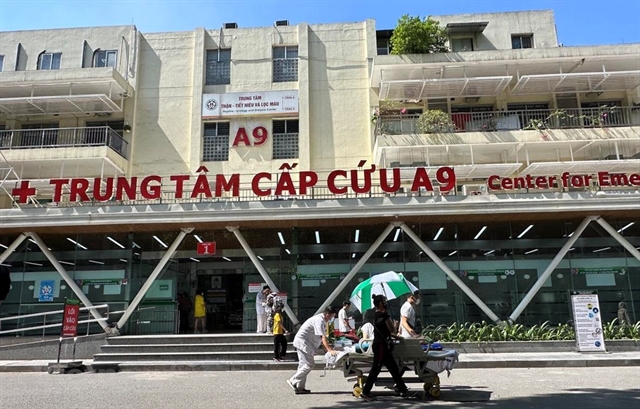 Society
Society

 |
| Doctors care for a COVID-19 patient at an intensive care unit in Việt Nam. VNA/VNS Photo |
HÀ NỘI – Việt Nam has established itself as one of the leading countries in the fight against emerging diseases in the context of a number of dangerous and fast-spreading epidemics in the world over the past years like COVID-19 and earlier, SARS or MERS-CoV.
Over the past 30 years since the inception of the national Expanded Immunisation Programme, Việt Nam has significantly enhanced its capacity for monitoring, detecting, diagnosing, and responding to disease outbreaks swiftly and effectively. Despite socio-economic challenges, improvements have been recorded in the prevention and control of dangerous and emerging diseases, reception and treatment of patients, as well as the preparedness to respond to dangerous epidemics.
As a result, many deadly contagious diseases have been brought under control and eradicated such as smallpox eliminated in 1978, polio in 2000, and neonatal tetanus in 2005 while no new cases of bubonic plague have been reported since 2002.
Infections of other epidemics like diphtheria, whooping cough and measles have also been reduced by hundreds or even thousands of times compared to the time prior to the Expanded Programme on Immunisation. Many other endemic diseases, such as dengue fever, viral encephalitis, tuberculosis, typhoid, and cholera, have been curbed. Infections and fatalities have been minimized, with no major breakouts occurring.
Việt Nam was one of the first countries to succeed in containing the SARS, A/H5N1, and A/H1N1 outbreaks. It also successfully prevented some dangerous and emerging diseases like A/H7N9, Ebola, and MERS-CoV from entering the country.
In particular, after more than three years, Việt Nam has managed to contain the unprecedented COVID-19 pandemic that spread around the globe, thus greatly helping with its socio-economic recovery and development.
Monitoring and testing capacity has also been promoted when it comes to emerging communicable diseases, from MERS-CoV, Ebola to A/H7N9 and COVID-19. The communicable disease surveillance system, including surveillance in the community, at border gates and at laboratories, along with surveillance in areas with abnormal epidemiological factors has proved effective.
The achievements of Việt Nam have earned worldwide recognition. The country’s good performance has enhanced people’s trust and won admiration from the international community.
Pointing out complex developments of communicable diseases in the world, Deputy Minister of Health Nguyễn Thị Liên Hưong said the tropical monsoon climate and growing trade and tourism make Việt Nam highly vulnerable to different epidemics.
To prevent diseases from becoming epidemics and gearing up for future pandemics or health emergencies, the Ministry of Health (MoH) will push ahead with implementing tasks and solutions as assigned by the Party Central Committee, National Assembly, Government, and Prime Minister, she noted.
The Ministry will enhance access to global health security in disease prevention and control by sharing information and experiences through bilateral and multilateral cooperation mechanisms. This demonstrates its commitment to international cooperation in epidemic response, as stated by the official
At a ceremony held on December 27, 2023 in response to the International Day of Epidemic Preparedness, the MoH asked provinces and centrally-run cities to enhance disease prevention and control; ready response plans in case of pandemics or health emergencies; improve the capacity of anti-epidemic systems at all levels, especially in disadvantaged, remote, mountainous, border, maritime, and ethnic minority areas; and engage all sides, including authorities, sectors, and socio-political organisations, in the work.
The MoH also called on the entire people and community to better disease awareness, improve their health, and actively join in disease prevention efforts. VNS